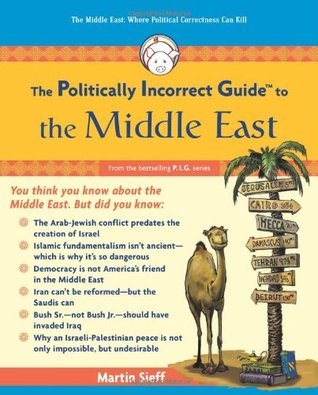I bought a bunch of Politically Incorrect Guides back when they first came out. I liked the first several I read, but then it seemed like they were just rushing these out on any topic they could think of due to the success of the first few. The first few I read, such as the ones on the Civil War and Science, were in-depth studies by clear experts in their fields. Although I liked this one on the Middle East, it seemed like much more of an overview than some of the others. I’m glad that it constrained itself to really just covering the 20th century up until about 2007 and not the region’s entire history, but even covering that time period in just over 200 pages really doesn’t leave much room for depth and analysis.
However, I do think this provides a good foundation for learning more about the Middle East and helped me to fill in gaps in my knowledge, particularly about the time leading up to WWII and the 60s and 70s. I wish there had been a little more analysis and less A happened, then B happened, then C happened. That doesn’t mean the author didn’t let his opinion sneak in, but for the most part it read like a list of facts rather than a cohesive narrative. I just don’t think I’ll remember a lot of things from the book as well as I do when it’s presented a little differently.
For those assuming this will come from an entirely pro-Republican perspective, the author has major issues with Bush and believes most of our presidents on both sides have been fairly inept at dealing with the Middle East, primarily because we expect them to act like a Western democracy. I think Ford is the only president he really praises, and that’s mainly because Ford got out of Kissinger’s way.
A few of the highlights of what I learned:
1. The term “Palestinian” was originally used to refer to Palestinian Jews. This term was used to refer to Jewish people living in the area until the 1950s. After the creation of Israel they began using the term “Israelis” or “Israelites” to refer to themselves and that caught on. When Arafat came to power in 1964, he needed a term for the Arabs in the region, many of whom had been kicked out of the neighboring countries and didn’t have a cohesive identity. He started using the term Palestinian and obviously it stuck.
2. The Ba’ath party was started by socialists interested in social justice. The founders were people who had Western educations and had become Marxists. Instead they ended up becoming totalitarian dictators led by Saddam Hussein (who idolized Stalin). Weird how that always seems to happen…
3. Saudi Arabia has been our ally more often than I thought. Bin Laden likely used people from SA in the 9/11 attack on purpose to try to break our relationship. Historically though, we tend to work together and our someone we need in the area. I also learned more about their history and how we blow Lawrence of Arabia's role in helping them develop way out of proportion. I really didn't know much about him either, so I found that section quite helpful.

